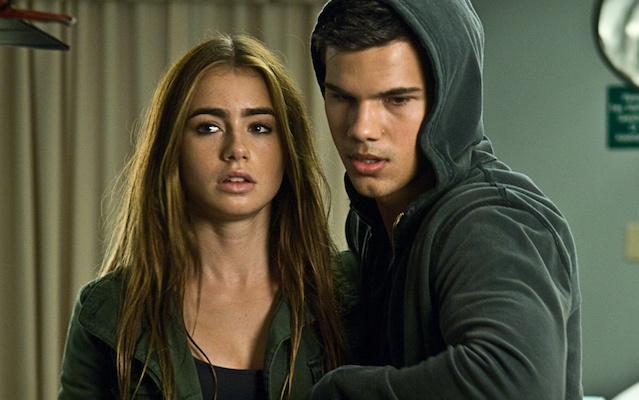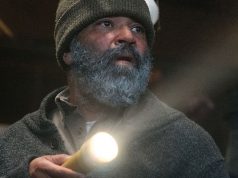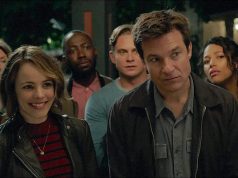
As soon as plasticine llama-human hybrid Taylor Lautner became a household name in households where teenage girls live, the young “Twilight” star set out to prove that he can do more than take off his shirt and be the third wheel in an adolescent soap opera. To demonstrate this, he took the lead in “Abduction,” a robot-written, factory-assembled, man-on-the-run action thriller. Lautner remains shirted for almost the entire film, silencing critics who cynically assumed he would capitalize on his creepily smooth comic-book-character abdominal muscles. On the other hand, critics who cynically assumed he would not be very good at being the lead actor in a drama had plenty to talk about.
“Abduction” was somehow accidentally directed by John Singleton, exactly 20 years after his “Boyz n the Hood” made us assume that he would never direct something like “Abduction.” It stars Lautner as Nathan Harper, a Pittsburgh teenager who is first seen riding on the hood of a friend’s car en route to a raucous house party, where he drinks until he passes out. This is to let viewers know that Nathan is nothing like that goody-two-shoes doormat Jacob the werewolf, who is literally a monster and yet somehow also a wuss. Nathan may not be a deadly carnivore cursed by ancient evil to walk the earth in search of flesh, but he knows how to par-tay (i.e., binge-drink)!
Nathan’s parents (played by Jason Isaacs and Maria Bello) are a couple of big ol’ meanies who don’t approve of their high-schooler son staying out all night drinking. Dad’s method of punishment is to give a hungover Nathan boxing lessons in the backyard, a tactic that teaches Nathan self-discipline while also allowing Dad to punch him in the face. The sparring session ends when Nathan delivers a roundhouse kick to his father’s chest. Dad considers this cheating, insofar as it is not “boxing,” per se, but Nathan reminds him: “You always said the person that ends the fight is the winner.”
His dad always said THAT? Like, as fatherly advice? “Son, if you’re ever in a fight, it doesn’t matter if you fight fair or dirty, as long as you’re the one left standing at the end while your opponent writhes in pain on the ground”?
Anyway, Nathan is seeing a therapist, Dr. Bennett (Sigourney Weaver), to help him with his various issues, which include “insomnia, impulsivity, and anger management” (so, yeah, teaching him how to fight is definitely a good idea). Nathan tells Dr. Bennett that he feels different from the other kids his age, and that he’s still having a recurring dream about a woman dying in a Paris hotel room. Since we have seen movies before, we know that this dream is a flashback to Nathan’s forgotten past. Nathan and Dr. Bennett do not make this connection, however, leading us to assume that they have not seen movies before.
As for why Nathan feels different from other kids, I don’t know. Maybe other kids’ fathers don’t engage them in fistfights as punishment for drinking?
We get to the real meat of the film when Nathan is assigned to partner up with Karen (Lily Collins), whom he has a crush on, for a sociology research paper. Quickly growing bored with actual research, Nathan and Karen start looking at a website about missing children and laughing at the computer-rendered images that speculate on what the kids would look like today. You have to admit, this is hilarious. But the laughter ceases when they stumble across a missing boy whose computerized 18-year-old self looks just like Nathan! Well, it looks more lifelike and alert than him, but it’s otherwise pretty close.
Nathan’s investigation into the matter attracts the attention of bad guys, and two assassins are dispatched to Nathan’s house to kill his parents, who it turns out are not really his parents, though they really do get killed. Fleeing the scene, Nathan calls 911 and gets a CIA agent named Burton (Alfred Molina) instead, because this is the kind of movie where shadowy government types can instantly retrieve information about any person — including that person’s current exact whereabouts — and reroute telephone calls as needed.
Burton tells Nathan that the CIA wants to help him and that he should follow Burton’s instructions. “You need to trust me,” he says. Nathan responds: “Trust needs to be earned.” OH SNAP! That’s what Nathan’s non-mother told him after he stayed out all night drinking! Of course, she was overreacting to Nathan’s reckless, illegal, and irresponsible behavior, because she was a total square who didn’t understand young people. So it’s gratifying that Nathan has found a way to use the line on someone who really deserves it: an authority figure who is probably honestly trying to help him.
(It will eventually become clear that Burton is not to be trusted, but Nathan doesn’t know that at this point. Nathan’s only reason for not trusting him is that Nathan is a petulant little bastard.)
So what’s up? Did the people Nathan called his parents steal him from his real parents? Did they “abduct” him, hence the film’s title? No, they did not. (There are no abductions in the movie “Abduction.” Why would you assume there were?) Nathan’s real father, a CIA black-ops agent, was unable to care for Nathan after his wife died when Nathan was 2, so the kid was sent to live with Mr. and Mrs. Harper, who I guess were also CIA agents? Who happened to be married to each other? Who didn’t have or want kids of their own? I guess?
Anyway, now Nathan’s real father, still working for the CIA, has obtained an encrypted list of government agents who have sold state secrets to the enemy, and the Serbian bad guy who found the list in the first place wants it back so he can blackmail the government with it. His name is Kozlow (Michael Nyqvist), and he wants to capture Nathan to use him as a bargaining chip. Evidently it was common knowledge among Serbian villains that this CIA black-ops agent had a secret son. Apparently everyone knew it except Nathan.
Agent Burton doesn’t want Kozlow to get the list back no matter what. Again, because we have seen movies before, we know that this is because Burton’s name is on the list. When it turns out that Nathan’s therapist is also secretly a CIA agent who’s been assigned to keep an eye on him, we briefly entertain the possibility that it is she who is bad, not Burton. That is the kind of twist that movies of this genre (Regular Idiot Becomes Action Hero While Fleeing Government Villains) often employ. But in this case, no, everything is exactly as it appears to be. The only surprise at the end is that you’re still watching.
So Nathan and Karen are on the run — Nathan because Kozlow and Burton are after him; Karen for no reason except hey, the movie needs a girl. They end up on a train, where they profess their feelings for one another and kiss passionately, then separate just long enough for a bad guy to grab Karen and tie her up so he can fight with Nathan, who remembers the training his not-father gave him in the backyard and shoves the villain out of the train’s window. While Nathan is recalling his fake dad’s advice to fight with as little honor and dignity as possible, Karen escapes from her bonds all by herself, thank you very much, though you can bet Nathan will take the credit for saving her.
Throughout all of this, whether he’s kissing a girl, learning the truth about his parents, or being kicked in the groin, Nathan’s facial expression remains fixed. Coincidentally, it is the same expression that Taylor Lautner always has on his face, that of a very dumb puppy who is fervently trying to work out a math problem. It is this flat, dead-eyed central performance that hurts the movie most — not the story’s inherent absurdity; not the part at the end where Kozlow gets shot in front of a crowded baseball stadium and nobody notices; not the part where Sigourney Weaver sneaks Nathan out of danger behind a bouquet of helium balloons and then, once Nathan is safe, releases the balloons and says, in a tough Ellen Ripley voice, “I hate balloons.” And when your performance is the worst thing about a movie that also has Sigourney Weaver saying “I hate balloons,” you know you’ve really done something special.
— Film.com





